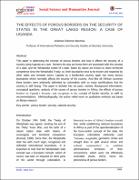| dc.description.abstract | This paper is addressing the concept of porous borders and how it affects the security of a country using Uganda as a case. Borders the way we know them are associated with the concept of a state, and the Westphalia model of a state. States by nature are known to claim territorial competence since the Westphalia Treaty; so, their boundaries have to be known and respected by other states and nonstate actors. Uganda as a landlocked country again has many porous boundaries which normally affects the security of the country. And like all African countries these borders were arbitrarily delimited by colonialists with so many ramifications that the country is still facing. This paper is divided into six parts, namely; Background information, conceptual questions, analysis of the causes of porous borders in Africa, the effects of porous borders on Uganda‟s Security, and exceptions to the concept of border security, as well as recommendations. Methodologically, the author relied more on qualitative methods and based on library research. | en_US |


